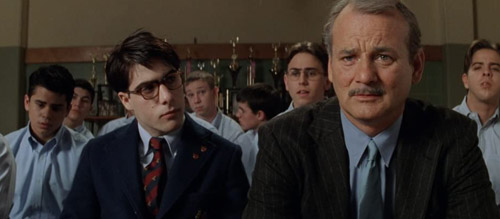
Rushmore (USA: Wes Anderson, 1998: 93 mins)
Bennett, Alanna. "WES ANDERSON'S OBSESSED WITH SYMMETRY, WATCH THIS SUPERCUT OF PROOF." Bustle (March 19, 2014)Bordwell, David. "THE GRAND BUDAPEST HOTEL: Wes Anderson takes the 4:3 challenge." Observations of Film Art (March 26, 2014)
Brubaker, Philip. "The Childhood Whimsy of Wes Anderson." (Posted on Vimeo: 2019)
Connor, Christopher. "Rushmore (1998)." The Film Magazine (December 3, 2020)
Long, Ericca and Cole Roulain. "Rushmore." The Magic Lantern #160 (June 14, 2021)
Long, Ericca and Cole Roulain. "Rushmore." The Magic Lantern #160 (June 14, 2021)
McKim, Kristi Irene. "Rushmore." New Books in Film (May 3, 2024) ["Earning critical acclaim and commercial success upon its 1998 release, Rushmore-the sophomore film of American auteur Wes Anderson-quickly gained the status of a cult classic. A melancholic coming-of-age story wrapped in comedy drama, Rushmore focuses on the efforts of Max Fischer (Jason Schwartzman)-a brazen and precocious fifteen-year-old-to find his way. Restless, energetic, struggling, and overcompensating for his insecurities, Max pursues a dizzying range of possible futures, leading him into the orbit of local steel magnate Herman Blume (Bill Murray), elementary school teacher Rosemary Cross (Olivia Williams), and a host of cooperative schoolmates who help him to stage lavish film-derivative plays.
Kristi McKim's book Rushmore (British Film Institute, 2023) argues that despite the film's titular call for haste and excess (rush/more), it challenges a drive toward perfectionism and celebrates the quiet connections that defy such passion and speed. After establishing Rushmore's history and reception, McKim closely reads Rushmore's energetic musical montages relative to slower moments that introduce tenderness and ambiguity, in a form subtler than Max's desire-built drive or genre-based plays."]
Reft, Ryan. "The Sexuality of “Whimsy”: Gender and Sex in the Films of Wes Anderson." Tropics of Meta (September 24, 2012)
Seitz, Matt Zoller. "The West Anderson Collection Chapter 2: Rushmore." (Posted on Vimeo: 2014) [Part of a series of 8 video essays on Anderson's films. You can access the rest here.]
Kristi McKim's book Rushmore (British Film Institute, 2023) argues that despite the film's titular call for haste and excess (rush/more), it challenges a drive toward perfectionism and celebrates the quiet connections that defy such passion and speed. After establishing Rushmore's history and reception, McKim closely reads Rushmore's energetic musical montages relative to slower moments that introduce tenderness and ambiguity, in a form subtler than Max's desire-built drive or genre-based plays."]
Reft, Ryan. "The Sexuality of “Whimsy”: Gender and Sex in the Films of Wes Anderson." Tropics of Meta (September 24, 2012)
Seitz, Matt Zoller. "The West Anderson Collection Chapter 2: Rushmore." (Posted on Vimeo: 2014) [Part of a series of 8 video essays on Anderson's films. You can access the rest here.]
Studio Binder. "The Wes Anderson Style Explained — The Complete Director's Guide to Wes Anderson's Aesthetic." (Posted on Youtube: April 26, 2021)
Velenczei, David. "Wes Anderson's Violence." (Posted on Vimeo: April 22, 2015)
Wes Anderson // Centered from kogonada on Vimeo.
Velenczei, David. "Wes Anderson's Violence." (Posted on Vimeo: April 22, 2015)
Wes Anderson // Centered from kogonada on Vimeo.
No comments:
Post a Comment